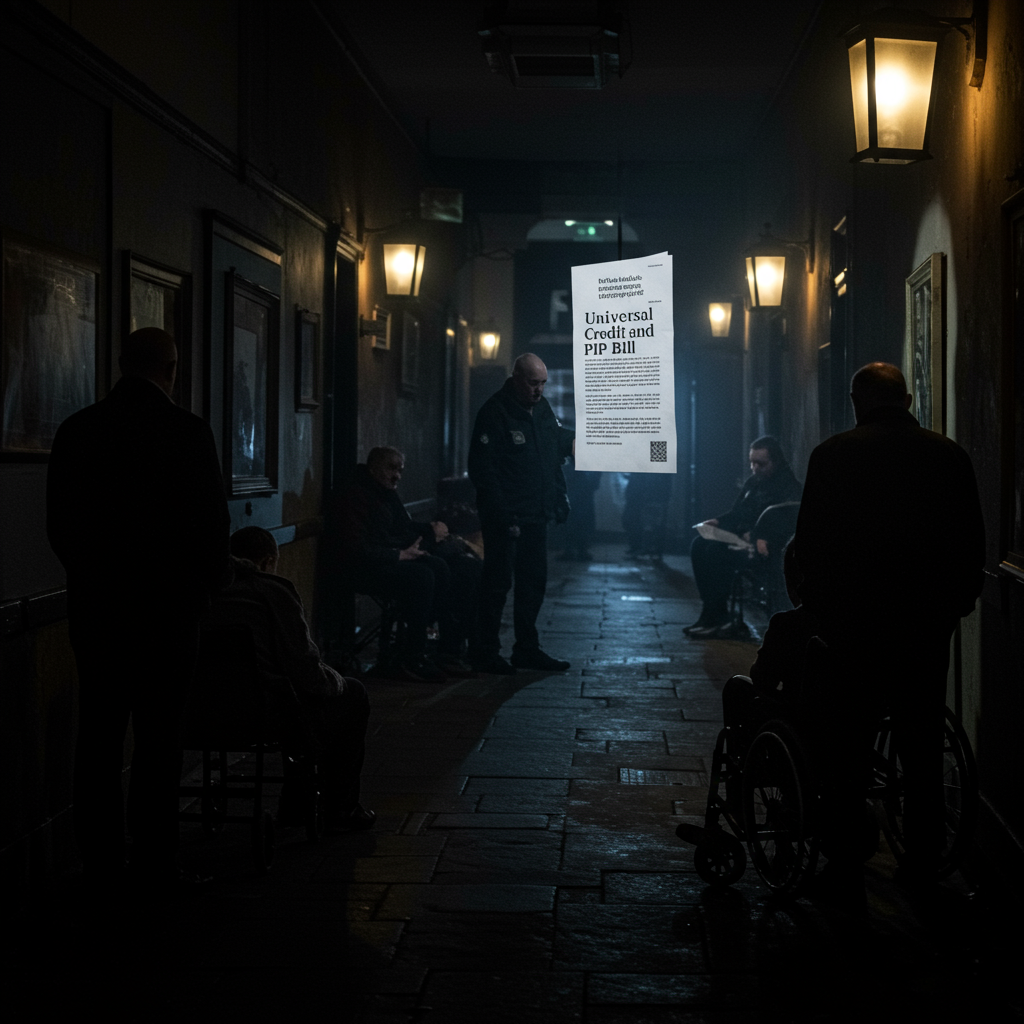A contentious piece of UK legislation narrowly passed its latest parliamentary stage this week, triggering significant debate and internal party conflict. Titled the Universal Credit (UC) and Personal Independence Payment (PIP) Bill, the proposed law seeks to adjust access to crucial welfare support, potentially impacting vulnerable individuals across England, Wales, Scotland, and Northern Ireland. Critics swiftly condemned the measures as “Dickensian,” raising concerns about increased hardship for those reliant on state assistance.
The bill’s journey through Parliament has been marked by political drama and eleventh-hour concessions. While proponents argue reforms are necessary to create a sustainable system, opponents highlight the potential for pushing more people into poverty and undermining support for disabled individuals and those with long-term health conditions. Understanding the core proposals, the reasons behind the fierce opposition, and the compromises made is essential to grasping the full implications of this controversial legislation.
What the Bill Proposed
The Universal Credit (UC) and Personal Independence Payment (PIP) Bill initially outlined significant alterations to how individuals access two key benefits:
Personal Independence Payment (PIP) changes
PIP provides financial support to working-age people in England, Wales, and potentially Northern Ireland, who have long-term physical or mental health conditions or disabilities, helping them cover associated extra costs. It has two components: daily living and mobility, assessed using a points system across ten activities. Eligibility traditionally relies on accumulating a certain total number of points.
The bill initially proposed a stricter eligibility threshold, set to begin in November 2026. Instead of needing a total score, claimants would need to score at least four points in a single activity to qualify. Experts warned this could disadvantage individuals whose conditions affect them across multiple areas without meeting the four-point threshold in any one activity, particularly impacting those with mental health issues who might only score two points per activity for needing reminders or encouragement. Initial estimates suggested this original plan could affect up to 1.2 million people.
Universal Credit (UC) Adjustments
Universal Credit is a single monthly payment for people in or out of work. The bill included changes to the “health element” within UC, an additional payment for claimants deemed unable to work due to a health condition.
Under the proposed changes (applying to England, Wales, Scotland, and potentially Northern Ireland), the health element for new claims would be reduced from the current rate (over £400 per month) to approximately £50 per week, effective from April 2026. Access to this top-up payment would also be restricted to claimants aged 22 and over, removing it for those younger than 22. However, the bill also included a commitment to increase the health element rate for existing claimants annually, at least in line with inflation. The Department for Work and Pensions (DWP) estimated that the UC changes alone could result in 730,000 future claimants receiving significantly less support.
Why Did the Bill Spark Such Opposition?
The proposed reforms met a storm of criticism from various quarters, including opposition parties, backbench MPs within the government’s own party, disability rights organizations, social workers, and affected individuals.
At the heart of the opposition were fears that the changes would disproportionately harm vulnerable people, pushing them further into poverty and making life significantly harder. Labour MP Rachael Maskell echoed concerns from disability and human rights groups that the voices of disabled people were not adequately considered during the reform process.
Social worker Liz Howard, speaking for the British Association of Social Workers, described the potential impact as a “ticking time bomb,” warning of a “real risk” that individuals would “fall through the gaps,” potentially leading to tragic outcomes like increased deaths and homelessness. Dave Finch of the Health Foundation highlighted the impossible choices claimants might face with reduced income, potentially having to cut back on essentials like food, heating, or vital healthcare support.
Furthermore, critics argued that reducing access to PIP could have ripple effects beyond direct financial loss. PIP often acts as a “marker of need,” enabling access to crucial local council and NHS services. Restricting eligibility risks “erasing” vulnerable people from systems already strained by austerity, according to Howard. Campaigners and disabled people felt the reforms seemed to say, “we don’t care about your future,” undermining their right to independent living and participation in society. Ellen Clifford of Disabled People Against Cuts labeled the government’s approach as “smoke and mirrors,” demonstrating a lack of genuine commitment to supporting disabled people.
The Political Battleground
The passage of the bill through Parliament’s second reading proved a significant challenge for Prime Minister Sir Keir Starmer, despite his substantial parliamentary majority. Facing widespread anger and a potential rebellion of over 120 of his own MPs, the government was forced to make substantial concessions just before the vote.
Initially, the Work and Pensions Secretary announced that the stricter PIP rules would only apply to new claimants from November 2026, protecting existing recipients. This was coupled with a commitment to a review of the PIP assessment process, led by Minister for Disabled People, Sir Stephen Timms, involving disabled people and independent organizations. However, concerns lingered that the changes might still pre-empt the review’s findings, potentially creating a “two-tier system.”
In an astonishing move just hours before the vote, the government announced a further, critical U-turn: the sections of the bill introducing the new, stricter PIP eligibility criteria were removed entirely. Any changes to PIP eligibility will now only be considered after the completion of the planned review in Autumn 2026.
While these last-minute changes averted a larger rebellion, the bill’s passage (335 votes to 260) was still met with significant dissent from within the government’s ranks. 49 Labour MPs voted against the bill, and 18 others abstained, highlighting deep divisions and a breakdown of trust. Labour MPs like Marie Tidball spoke tearfully against the original proposals, emphasizing PIP’s role in enabling independent living, while Rachael Maskell called the cuts “Dickensian” and inconsistent with Labour values.
The concessions, while appeasing some, led to the bill being described as “gutted” of its most significant potential savings. The Institute for Fiscal Studies (IFS) estimated that, without the PIP changes, the bill is now expected to yield “virtually no medium-term savings,” delivering “not expected to deliver any savings over the next four years” by 2030. This lack of financial impact raised questions about the bill’s primary justification and fueled speculation about potential future tax rises, a prospect Prime Minister Starmer did not rule out when questioned.
The chaotic process, marked by rapid reversals, drew sharp criticism from MPs across parties, casting a shadow over Starmer’s leadership effectiveness, especially given the size of his majority.
Impacts and Ongoing Concerns
Despite the removal of immediate, drastic changes to PIP eligibility, the bill still contains controversial elements, particularly the reduction of the UC health element for new claimants under 22. This, alongside the stressful legislative battle, has left disabled people and campaigners feeling disappointed, drained, and deeply suspicious of the government’s true intentions.
Individuals like Tim Boxall, who relies on PIP to afford essential care for multiple sclerosis, described the benefit as a “lifeline” enabling “a life, not just an existence.” Sarah Finnegan, housebound with ME, fears how she would cope without PIP, which pays for carers, questioning how she would keep her child warm and fed. Both expressed profound distrust in the government’s commitment to genuinely consulting disabled people in the future review.
Disability charities offered mixed reactions; some welcomed the apparent willingness to listen, while others felt the concessions were rushed and failed to fix a fundamentally flawed bill. Concerns persist about the impact on future UC claimants and the need for genuine, meaningful engagement with disabled people in shaping future policy.
The “limbo” created by delaying PIP changes pending a review also causes anxiety. Dave Finch argued that these concessions should have been discussed much earlier, rather than being a last-minute reaction. Liz Howard reiterated that making changes to the welfare system without fully understanding its place within the broader health and social care landscape is “incredibly risky and damaging.”
The debate over the welfare system’s future is far from over. The focus now shifts to the planned review of PIP and the implementation of the UC changes, all against a backdrop of unresolved questions about sustainability, potential tax implications, and the government’s relationship with vulnerable citizens.
Frequently Asked Questions
What were the main changes originally proposed by the UK welfare bill for benefits like PIP and Universal Credit?
The bill initially proposed stricter eligibility criteria for Personal Independence Payment (PIP), requiring new claimants from November 2026 to score at least four points in a single assessment activity. For Universal Credit (UC), it aimed to reduce the health element for new claimants under 22, lowering their additional financial support. However, following significant opposition, the proposed PIP eligibility changes were removed from the bill before its parliamentary vote, while the UC changes for under-22s remained.
Where will further decisions or reviews regarding PIP eligibility changes take place?
Any future changes to Personal Independence Payment (PIP) eligibility criteria will now be made only after a government-led review of the PIP assessment process is completed. This review is being conducted by the Minister for Disabled People and independent organizations, with its findings expected to be published in Autumn 2026. Decisions about implementing any recommended changes would follow this review.
How might future claimants of Universal Credit’s health element be affected by the welfare bill?
Under the passed bill, new claimants of the Universal Credit (UC) health element who are under the age of 22 will no longer receive the full additional payment previously available for those with difficulty working due to health. This means future young claimants could receive significantly less financial support compared to current recipients of this element, potentially impacting their ability to cover essential costs related to their condition.
What Happens Next?
With the bill having passed its second reading in Parliament, it will now undergo further scrutiny in committee stage and potentially pass through further readings in both the House of Commons and the House of Lords. While the immediate controversial PIP eligibility changes have been removed, the changes to Universal Credit for younger claimants remain.
The focus now shifts to the promised review of the PIP assessment process, set to report by Autumn 2026. This offers an opportunity for disabled people and their representatives to influence future policy, though many remain skeptical given the lack of prior consultation and the manner of the recent concessions.
Meanwhile, the lack of projected savings from the amended bill fuels ongoing debate about how the government will address the costs associated with welfare support. The possibility of tax increases, as hinted at by Prime Minister Starmer, remains a point of contention with the opposition.
The passage of this bill, despite its watering down, underscores the deep divisions within the political landscape regarding welfare policy and highlights the persistent concerns of those whose lives depend on the social security system. The fight for what constitutes fair and adequate support for disabled people and those with long-term conditions in the UK is far from over.
Word Count Check: 1205



